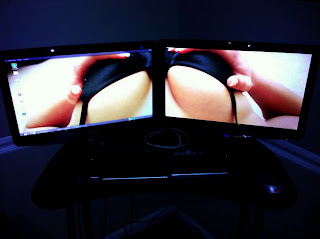A few months ago I embarked on a relentless search through mountains of RGBA patches, custom versions of nautilus, and failed attempts at allowing desktop icons to pierce through compiz's iron curtain.
Finally created a decent method of having wallpaper span dual monitors in Gnome by overriding Gnome's "Spanned" desktop setting (I don't think it works right anyway) with a "Zoomed" dual monitor setting. I first tried this by scaling the image directly, but it looked like crap so I figure Zoom would be better to use. The result is not perfect, but definitely better than waiting 15 years for the Gnome team to come up with a plausible solution.
The steps I took were for Arch Linux, but you can apply them equally well to any distribution, as long as you know how to make packages from source.
After reading through this bug, I realized I should be modifying the desktop settings directly.
I checked my Gnome version through pacman, and proceeded to download the PKGBUILD straight from the Arch SVN. After receiving the source code, I ran "makepkg" once to ensure the source would compile properly, then proceeded to comment out the following lines in the PKGBUILD file:
#source=(http://ftp.gnome.org/pub/gnome/sources/${pkgname}/2.32/${pkgname}-${pkgver}.tar.bz2)
#sha256sums=('blahblah')
#sha256sums=('blahblah')
To ensure that the source code would not be downloaded again & overwrite my modifications.
Next, I proceeded to open the "src/gnome-desktop-2.32.0/libgnome-desktop/gnome-bg.c" file, and commented out the following line, simply copying the Gnome "Zoom" option's code to the "Span" section of the case statement:
#if 0
g_print ("original_width: %d %d\n",
gdk_pixbuf_get_width (pixbuf),
gdk_pixbuf_get_height (pixbuf));
#endif
switch (placement) {
case GNOME_BG_PLACEMENT_SPANNED:
// new = pixbuf_scale_to_fit (pixbuf, width, height);
new = pixbuf_scale_to_min (pixbuf, width, height);
break;
case GNOME_BG_PLACEMENT_ZOOMED:
new = pixbuf_scale_to_min (pixbuf, width, height);
break;
case GNOME_BG_PLACEMENT_FILL_SCREEN:
new = gdk_pixbuf_scale_simple (pixbuf, width, height,
GDK_INTERP_BILINEAR);
break;
case GNOME_BG_PLACEMENT_SCALED:
new = pixbuf_scale_to_fit (pixbuf, width, height);
break;
case GNOME_BG_PLACEMENT_CENTERED:
case GNOME_BG_PLACEMENT_TILED:
default:
new = pixbuf_clip_to_fit (pixbuf, width, height);
break;
}
Finally, in the next section continaing the "GNOME_BG_PLACEMENT_SPANNED" (around 20 lines down from the previous section), I made the following modification to the code--commenting out what is commented in blue, and replaced with the code in red:g_print ("original_width: %d %d\n",
gdk_pixbuf_get_width (pixbuf),
gdk_pixbuf_get_height (pixbuf));
#endif
switch (placement) {
case GNOME_BG_PLACEMENT_SPANNED:
// new = pixbuf_scale_to_fit (pixbuf, width, height);
new = pixbuf_scale_to_min (pixbuf, width, height);
break;
case GNOME_BG_PLACEMENT_ZOOMED:
new = pixbuf_scale_to_min (pixbuf, width, height);
break;
case GNOME_BG_PLACEMENT_FILL_SCREEN:
new = gdk_pixbuf_scale_simple (pixbuf, width, height,
GDK_INTERP_BILINEAR);
break;
case GNOME_BG_PLACEMENT_SCALED:
new = pixbuf_scale_to_fit (pixbuf, width, height);
break;
case GNOME_BG_PLACEMENT_CENTERED:
case GNOME_BG_PLACEMENT_TILED:
default:
new = pixbuf_clip_to_fit (pixbuf, width, height);
break;
}
scaled = get_scaled_pixbuf (placement, pixbuf, dest_width, dest_height, &x, &y, &w, &h);
switch (placement) {
case GNOME_BG_PLACEMENT_TILED:
pixbuf_tile (scaled, dest);
break;
case GNOME_BG_PLACEMENT_ZOOMED:
case GNOME_BG_PLACEMENT_CENTERED:
case GNOME_BG_PLACEMENT_FILL_SCREEN:
case GNOME_BG_PLACEMENT_SCALED:
pixbuf_blend (scaled, dest, 0, 0, w, h, x + area->x, y + area->y, 1.0);
break;
case GNOME_BG_PLACEMENT_SPANNED:
// pixbuf_blend (scaled, dest, 0, 0, w, h, x, y, 1.0);
pixbuf_blend (scaled, dest, 0, 0, w, h, x + area->x, y + area->y, 1.0);
break;
default:
g_assert_not_reached ();
break;
}
g_object_unref (scaled);
switch (placement) {
case GNOME_BG_PLACEMENT_TILED:
pixbuf_tile (scaled, dest);
break;
case GNOME_BG_PLACEMENT_ZOOMED:
case GNOME_BG_PLACEMENT_CENTERED:
case GNOME_BG_PLACEMENT_FILL_SCREEN:
case GNOME_BG_PLACEMENT_SCALED:
pixbuf_blend (scaled, dest, 0, 0, w, h, x + area->x, y + area->y, 1.0);
break;
case GNOME_BG_PLACEMENT_SPANNED:
// pixbuf_blend (scaled, dest, 0, 0, w, h, x, y, 1.0);
pixbuf_blend (scaled, dest, 0, 0, w, h, x + area->x, y + area->y, 1.0);
break;
default:
g_assert_not_reached ();
break;
}
g_object_unref (scaled);
From here, I saved the source, ran "makepkg -f" again, installed the package, and restarted Gnome. Not perfect, but they are nice ;)

Lovely background indeed. =)
ReplyDeletewhere can i get that background
ReplyDeletehttp://img692.imageshack.us/img692/3391/wideboobs.jpg
ReplyDeletegood thinking man.
ReplyDeletei just did this under gentoo using an overlay, and it worked flawlessly. i must say, i appreciate the help. =)
for debian
ReplyDelete# apt-get source libgnome-desktop-2-17
# cd gnome-desktop-2.30.2/libgnome-desktop/
modify same as what you did
back to main directory gnome-desktop-2.30.2
# dpkg-buildpackage -us -uc
restart gnome
Thanks for your tips
You're welcome, hopefully someone can think of a better way to scale the image than my terrible method :).
ReplyDeleteThis still works in Gnome 3.16.4, but the constants have changed. It's now G_DESKTOP_BACKGROUND_STYLE_SCALED instead of GNOME_BG_PLACEMENT_SCALED. Thanks for this! I'm loving it so far. My background is not an adolescent fantastical objectification of women, but I appreciate it nonetheless. ;)
ReplyDeleteBaha, I was 19 at the time, but this comment made myself and other coworkers laugh. Thanks for the informative update on this ancient post!
Delete